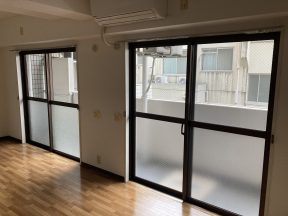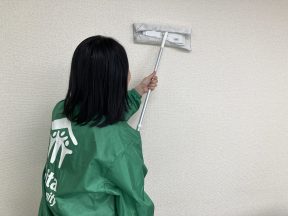Homefinding support exists as one pillar of Habitat Japan's domestic housing support program, "Project HomeWorks". As a designated housing support organization by the Tokyo Metropolitan Government, Habitat Japan works to support our home partners by not only sharing information, and accompanying them to room viewings and contract signings, but also by purchasing necessary household items, providing move-in support, and by holding follow-up consultations. Project HomeWorks benefits not only the elderly, but also those living under the poverty line, single parents, those with disabilities, and other groups facing difficulty or discrimination in home finding. Oshima-san (alias) is one of these home partners, in their fifties, who moved into new housing this January.
Despite only being in their fifties, Oshima-san told us that their body is "worse for the wear", with several chronic diseases one wouldn't be able to recognize from appearances alone. Carrying these illnesses since their youth, it's difficult for Oshima-san to go out on their own. With support from local social services Oshima-san is able to handle their daily outings, but home finding in particular requires a large number of outings for things like room viewings and contract signings. Oshima-san told us that while researching rooms online and contacting realtors over the phone lessened the burden, they were still unable to go out for room viewings on their own, making findign a room very difficult. The struggling Oshima-san then learned about Habitat Japan from a listing of housing support agencies and contacted our office in November of 2023.
 When we first spoke with Oshima-san, they seemed in a rush. When we asked about why they wanted to move, they told us that "my landlord told me I need to be out of my room by December." Half a year prior, the realtor managing Oshima-san's apartment building informed residents that the apartment was to be torn down and rebuilt, and that all residents must move out within three months of the announcement. Not only is it unjust to suddenly evict someone like Oshima-san, who paid their rent on time and hadn't caused any problems, but the landlord also never paid Oshima-san an eviction fee, of which they are legally required to. After consulting with their caseworker, Oshima-san decided they could stand their ground and exercise their right to continue living in the apartment.
When we first spoke with Oshima-san, they seemed in a rush. When we asked about why they wanted to move, they told us that "my landlord told me I need to be out of my room by December." Half a year prior, the realtor managing Oshima-san's apartment building informed residents that the apartment was to be torn down and rebuilt, and that all residents must move out within three months of the announcement. Not only is it unjust to suddenly evict someone like Oshima-san, who paid their rent on time and hadn't caused any problems, but the landlord also never paid Oshima-san an eviction fee, of which they are legally required to. After consulting with their caseworker, Oshima-san decided they could stand their ground and exercise their right to continue living in the apartment.
However, as other apartment residents began to move out one by one, Oshima-san was eventually left as the building's only tenant. Then in November came another letter from the landlord, demanding Oshima-san move out by December. This eviction request too, was unjust and illegal. However, Oshima-san was harassed and threatened by their landlord a number of times, and told us they would rather just move than continue living under such awful stress.
Habitat Japan, in cooperation with social services, accompanied Oshima-san to room viewings, contract signings, procedures at government offices, and shopping trips. Oshima-san was able to sign off on a new apartment in December and decided to move in mid-January. While we at Habitat Japan hoped that new housing would put Oshima-san at ease, they were still uncertain about the future.
 One point of anxiety was chemical sensitivity, one of Oshima-san's chronic disorders. Typically, rooms are cleaned for new tenants after the previous occupant moves out. Oshima-san told us that when moving into a new room they would react to residual cleaning projects and become dizzy and experience shortness of breath among other symptoms. To help prevent this, Habitat Japan staff offered to wipe down the walls and surfaces of the apartment with hot water and alcohol. After airing out the apartment and cleaning the ceiling, walls, and floor twice, the room was finally ready for Oshima-san to move in.
One point of anxiety was chemical sensitivity, one of Oshima-san's chronic disorders. Typically, rooms are cleaned for new tenants after the previous occupant moves out. Oshima-san told us that when moving into a new room they would react to residual cleaning projects and become dizzy and experience shortness of breath among other symptoms. To help prevent this, Habitat Japan staff offered to wipe down the walls and surfaces of the apartment with hot water and alcohol. After airing out the apartment and cleaning the ceiling, walls, and floor twice, the room was finally ready for Oshima-san to move in.
On the day of the move, after all of their belongings were packed up and removed, Oshima-san reflected on the empty room and told us "I lived in this room for 10 years now. I liked how spacious and sunny it was." When we asked her if they felt sad about moving away, they told us that "more than sadness, I feel glad to have a new home where I can live in peace".
Some time after the move, when our staff called to check how they were doing, Oshima-san told us that while they now had a home they could live in with peace of mind, they had some struggles with procedures for social services in their new area. At first glance, Oshima-san's chronic illnesses are difficult to recognize, sometimes making it difficult for those around them to recognize their needs. It will take some time to settle in to their new area and set up the necessary healthcare support channels. In the meantime, Habitat Japan is continuing to watch over Oshima-san's situation so that she may settle in and find stability as soon as possible.
Habitat Japan's domestic support initiatve, "Project HomeWorks" is made possible through the kind support of companies, organizations, and individuals. Please check below to donate.
